外研(新标准)版七年级下Revision module B 教学课件(43张)
文档属性
| 名称 | 外研(新标准)版七年级下Revision module B 教学课件(43张) |
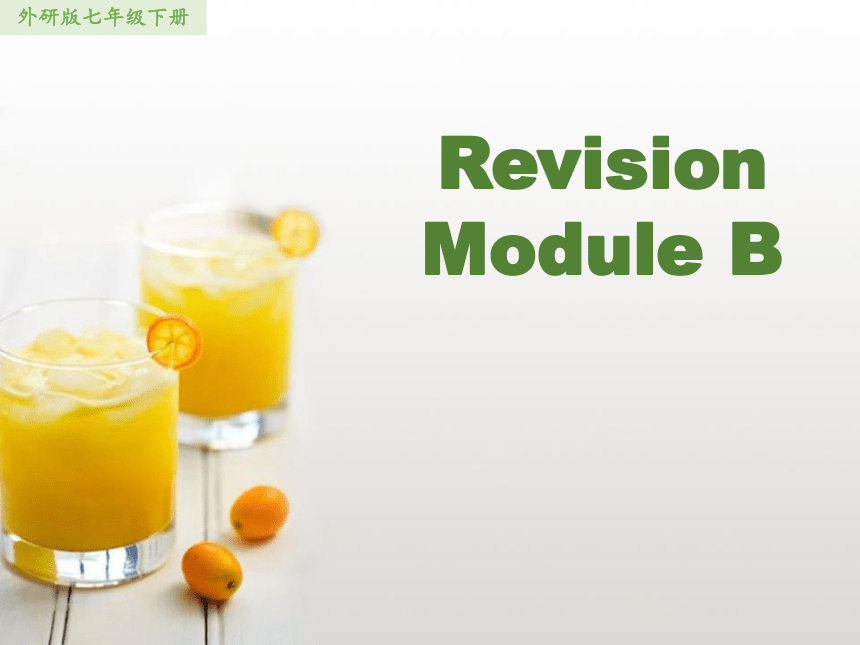
|
|
| 格式 | zip | ||
| 文件大小 | 2.6MB | ||
| 资源类型 | 教案 | ||
| 版本资源 | 外研版 | ||
| 科目 | 英语 | ||
| 更新时间 | 2018-06-04 07:07:06 | ||
图片预览

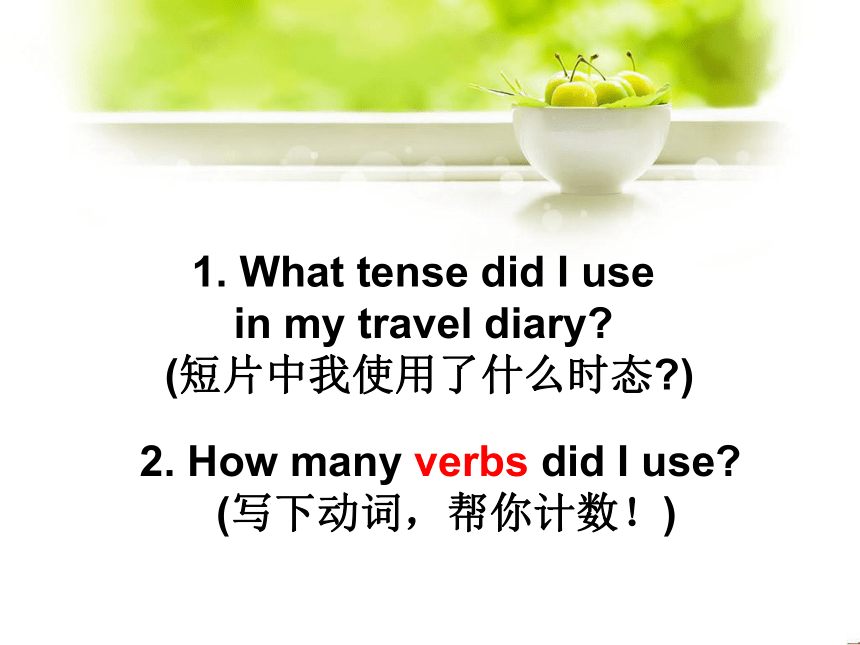
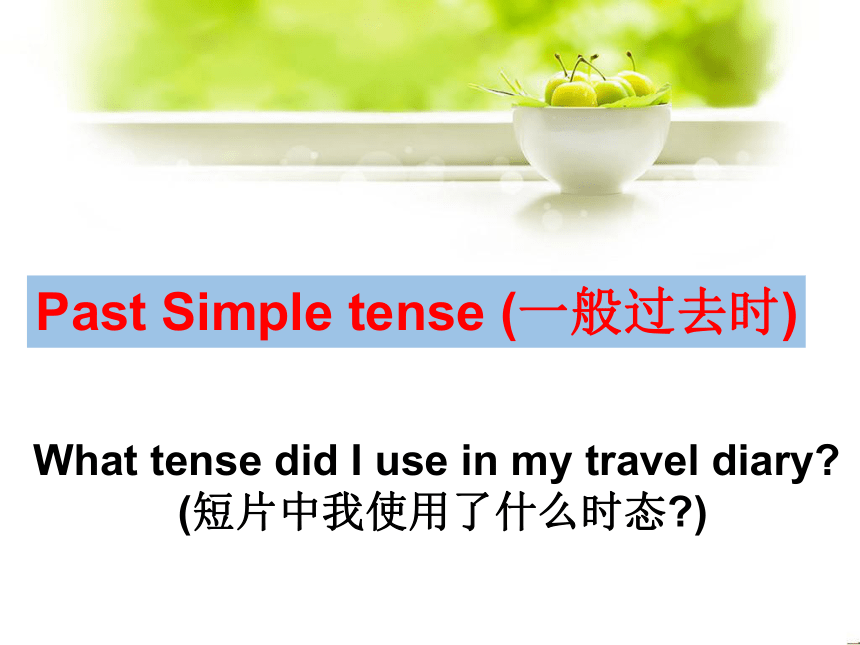
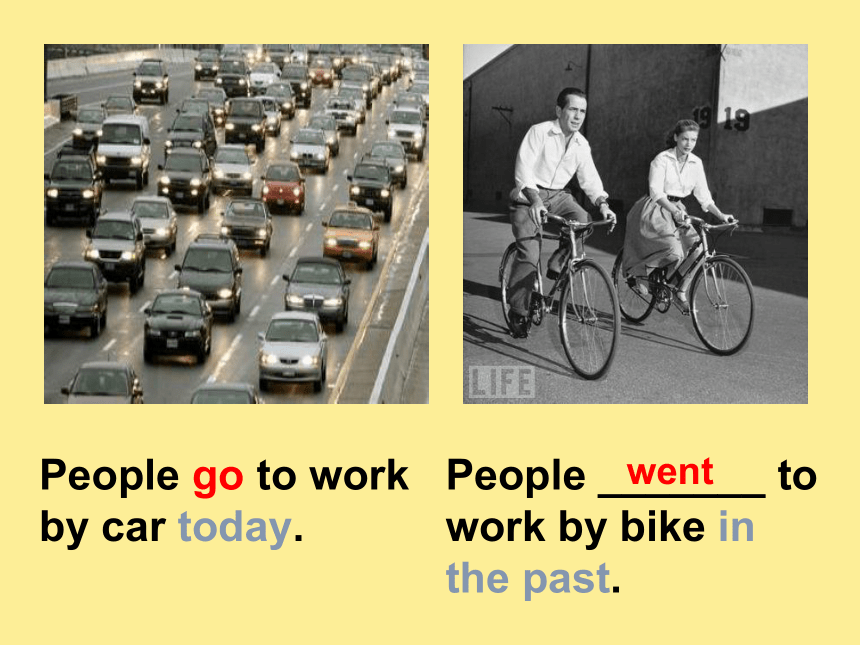
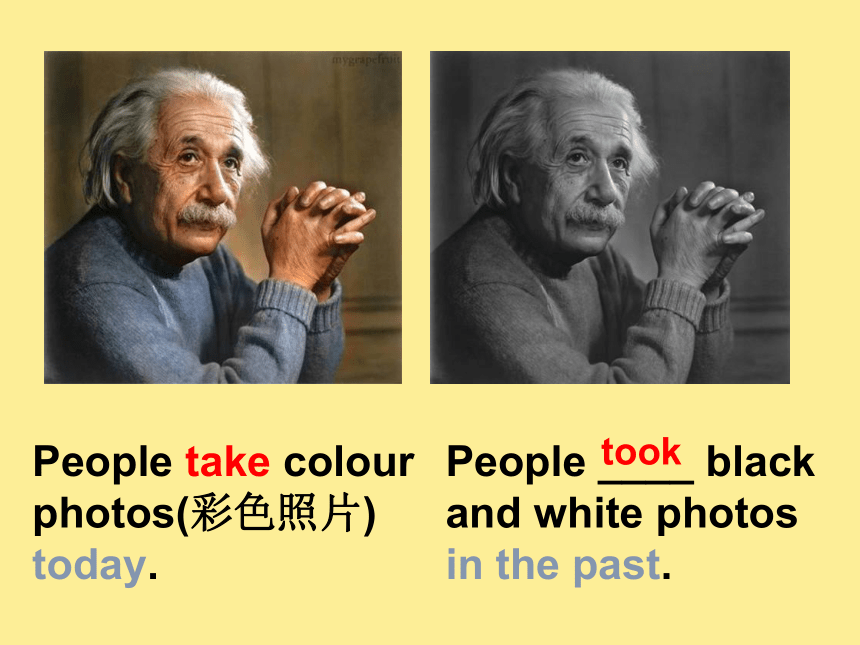
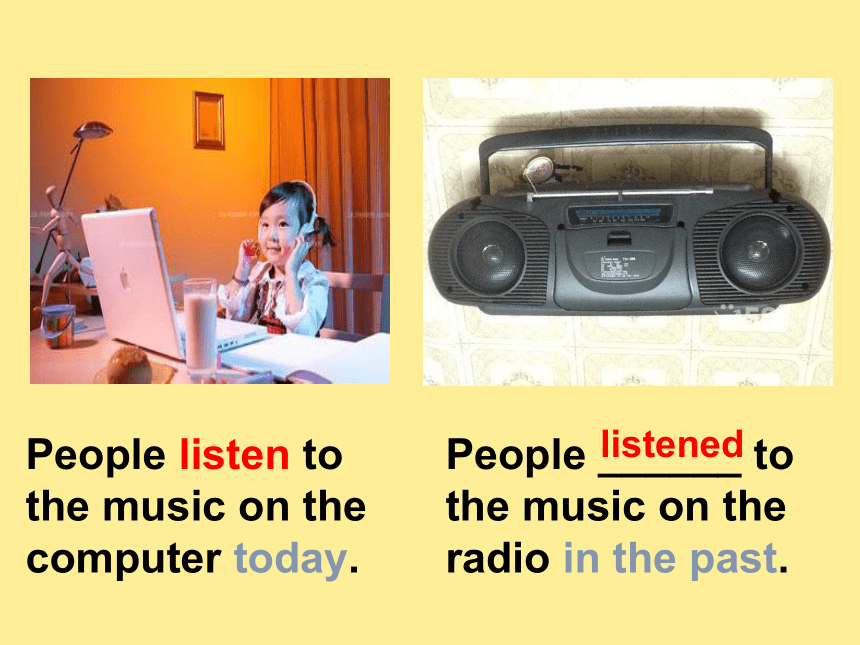


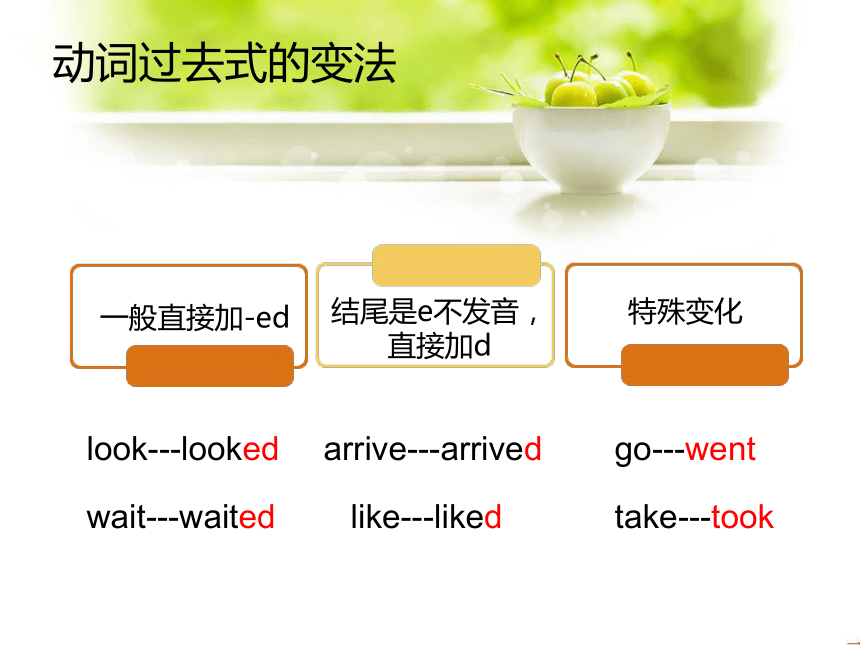

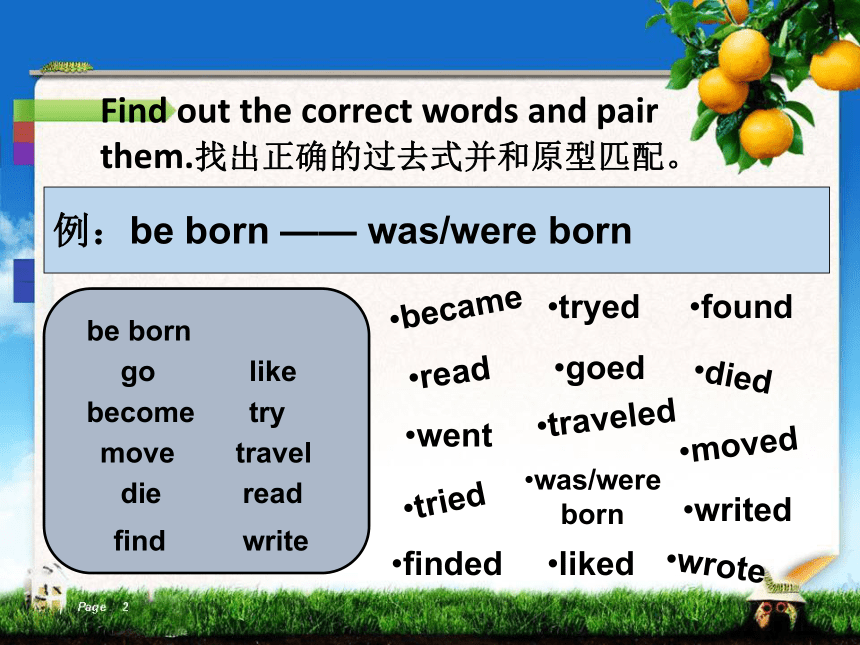
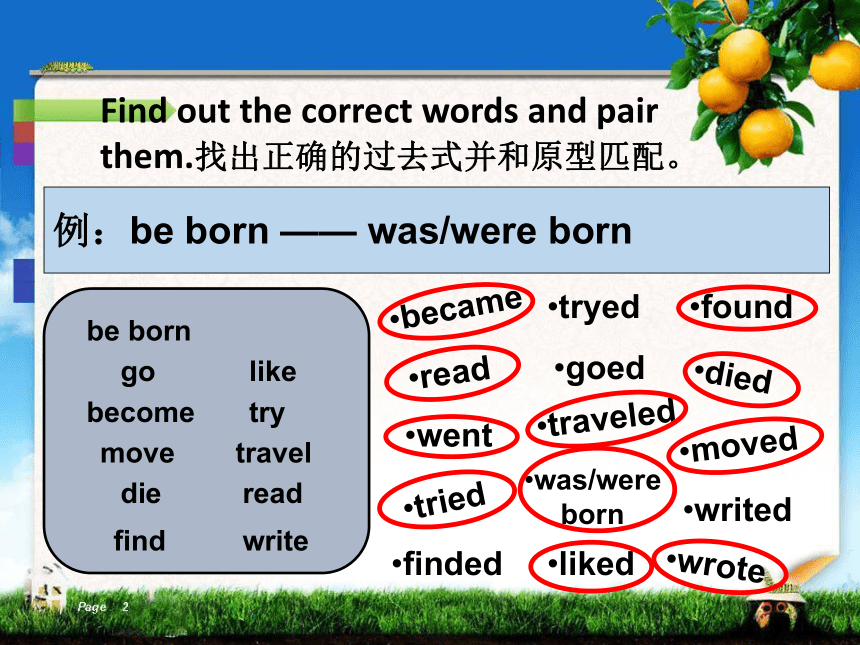
文档简介
课件43张PPT。Revision Module B外研版七年级下册2. How many verbs did I use?
(写下动词,帮你计数!)1. What tense did I use
in my travel diary?
(短片中我使用了什么时态?)What tense did I use in my travel diary?
(短片中我使用了什么时态?)Past Simple tense (一般过去时)People go to work by car today.People _______ to work by bike in the past.wentPeople take colour photos(彩色照片) today.People ____ black and white photos in the past.tookPeople listen to the music on the computer today.People ______ to the music on the radio in the past.listenedHow many verbs
did I use?Put the verbs into groups.
(将动词分组)点击添加文本点击添加文本点击添加文本点击添加文本动词过去式的变法特殊变化结尾是e不发音,
直接加d一般直接加-edlook---lookedwait---waitedarrive---arrivedlike---likedgo---wenttake---took点击添加文本点击添加文本点击添加文本点击添加文本动词过去式的变法去y变i加-ed“双写加”stop---stoppedstudy---studiedtry---tried辅音加y结尾Find out the correct words and pair them.找出正确的过去式并和原型匹配。例:be born —— was/were bornbecomebe borndiefindgolikemovereadtraveltrywritebecamediedfoundwentlikedtraveledreadtriedmovedwrotetryedgoedwritedfindedwas/were bornFind out the correct words and pair them.找出正确的过去式并和原型匹配。例:be born —— was/were bornbecomebe borndiefindgolikemovereadtraveltrywritebecamediedfoundwentlikedtraveledreadtriedmovedwrotetryedgoedwritedfindedwas/were borngo— wentbecome— move— die— find— like— try— travel— read— write— becamemoveddiedfoundlikedtriedtraveledreadwrote Read the following letter.Answer the
questions.Questions:When did Fiona arrive in Qingdao?
2. Who is Carol?
3. Did Carol sit on the rock in Zhanqiao Park?
4. Who did Fiona meet yesterday? Where did they eat?
5. What did Fiona send to Matt, a present or a postcard?
Questions:When did Fiona arrive in Qingdao?
2. Who is Carol?
3. Did Carol sit on the rock in Zhanqiao Park?
4. Who did Fiona meet yesterday? Where did they eat?
5. What did Fiona send to Matt, a present or a postcard?Fiona arrived on Friday afternoon.She is Fiona’s roommate.No, she didn’t.She met her old classmate and had dinner together in a Korean restaurant.She sent a nice postcard to Matt.Questions:When did Fiona arrive in Qingdao?
2. Who is Carol?
3. Did Carol sit on the rock in Zhanqiao Park?
4. Who did Fiona meet yesterday? Where did they eat?
5. What did Fiona send to Matt, a present or a postcard?Fiona arrived on Friday afternoon.She is Fiona’s roommate.No, she didn’t.She met her old classmate and had dinner together in a Korean restaurant.She sent a nice postcard to Matt.Questions:When did Fiona arrive in Qingdao?
2. Who is Carol?
3. Did Carol sit on the rock in Zhanqiao Park?
4. Who did Fiona meet yesterday? Where did they eat?
5. What did Fiona send to Matt, a present or a postcard?Fiona arrived on Friday afternoon.She is Fiona’s roommate.No, she didn’t.She met her old classmate and had dinner together in a Korean restaurant.She sent a nice postcard to Matt.Questions:When did Fiona arrive in Qingdao?
2. Who is Carol?
3. Did Carol sit on the rock in Zhanqiao Park?
4. Who did Fiona meet yesterday? Where did they eat?
5. What did Fiona send to Matt, a present or a postcard?Fiona arrived on Friday afternoon.She is Fiona’s roommate.No, she didn’t.She met her old classmate and had dinner together in a Korean restaurant.She sent a nice postcard to Matt.Questions:When did Fiona arrive in Qingdao?
2. Who is Carol?
3. Did Carol sit on the rock in Zhanqiao Park?
4. Who did Fiona meet yesterday? Where did they eat?
5. What did Fiona send to Matt, a present or a postcard?Fiona arrived on Friday afternoon.She is Fiona’s roommate.No, she didn’t.She met her old classmate and had dinner together in a Korean restaurant.She sent a nice postcard to Matt.①②③④⑤点击添加文本点击添加文本点击添加文本点击添加文本一般过去时的几种句式:肯定句否定句一般疑问句及回答特殊疑问句主语+v. 过去式+其他成分.e.g. We arrived by train on Friday afternoon.
We had dinner together in a Korean restaurant.
Lu Xun was a very famous writer.
It was so cool.
实义动词be动词肯定句:主语+be动词过去式+not+其他成分.e.g. Lu Xun was a very famous writer.
Lu Xun a very famous writer.
It was so cool!
It so cool! 与be动词过去式也可缩写
否定句: ( be 动词)was notwasn’twas notwasn’t主语+did+not+v. 原型+其他成分.否定句:(实义动词)e.g. We arrived by train on Friday afternoon.
We had dinner together in a Korean restaurant.
与did
可缩写成didn’tWe by train on Friday afternoon. We dinner together in a Korean restaurant.didn’t arrivedidn’t havebe动词过去式+主语+其他成分?e.g. Lu Xun was a very famous writer.
Was Lu Xun a very famous writer?
It was so cool.
Was it so cool?
肯定回答:Yes, 主语+相应be动词过去式.
否定回答:No, 主语+相应be动词过去式+not.一般疑问句: (be 动词)Did+主语+v. 原型+其他成分?一般疑问句:(实义动词)e.g. We arrived by train on Friday afternoon.
Did you arrive by train on Friday afternoon?
We had dinner together in a Korean restaurant.
Did you have dinner together in a Korean restaurant?肯定回答:Yes, 主语+did.
否定回答:No, 主语+didn’t.特殊疑问词+ 一般疑问句?回答:要求用完整的句子回答。如:
We arrived by train on Friday afternoon.
We had dinner together in a Korean restaurant.e.g. When did you arrive by train?
Where did you have dinner together?
特殊疑问句:注意时态!Exercise: 按要求完成句子1. He gave a nice birthday present to me last year. (改为否定句)
He ______ _______ a nice birthday present to me last year.
2. We went to the park and had a picnic. (改为一般疑问句)
______ ______ _______ to the park and _______ a picnic?
肯定回答: ________, _________ _________.
否定回答: ________, _________ _________.
3. Lingling watched TV with her parents last night. (划线提问)
_______ ______ Lingling _______ TV with her parents?
4. He put the book on the table.(划线提问)
_______ ______ he ______ the book? didn’t giveDid you go haveYes we didNo we didn’tWhen did watch Where did putAsk and answer:Talk about your last trip.Student A: Did you travel last year?
Student B: Yes, I did.
Student A: Where did you go?
Student B: I went to…
Student A: How many days did you stay there?
Student B: I stayed there for…
Student A: What did you do there?
Student B: I…Write down your answers.Check with your partner.Make sure that
your sentences are right.Write a short passage.Begin your passage like this:
Last year, I traveled to …...
On the first day, I…
On the second day, I…
On the third day, I…Use your sentences.My last tripLet’s show
your work! Please correct the mistakes.动词过去式的变法:
加ed,加d,双写加ed,
变y为i加ed,不规则变化Summary: 一般过去时:
表示过去某时间发生的动作或情况(包括习惯性动作)。 一般过去时的不同句式Homework:Finish your writing.
(写下动词,帮你计数!)1. What tense did I use
in my travel diary?
(短片中我使用了什么时态?)What tense did I use in my travel diary?
(短片中我使用了什么时态?)Past Simple tense (一般过去时)People go to work by car today.People _______ to work by bike in the past.wentPeople take colour photos(彩色照片) today.People ____ black and white photos in the past.tookPeople listen to the music on the computer today.People ______ to the music on the radio in the past.listenedHow many verbs
did I use?Put the verbs into groups.
(将动词分组)点击添加文本点击添加文本点击添加文本点击添加文本动词过去式的变法特殊变化结尾是e不发音,
直接加d一般直接加-edlook---lookedwait---waitedarrive---arrivedlike---likedgo---wenttake---took点击添加文本点击添加文本点击添加文本点击添加文本动词过去式的变法去y变i加-ed“双写加”stop---stoppedstudy---studiedtry---tried辅音加y结尾Find out the correct words and pair them.找出正确的过去式并和原型匹配。例:be born —— was/were bornbecomebe borndiefindgolikemovereadtraveltrywritebecamediedfoundwentlikedtraveledreadtriedmovedwrotetryedgoedwritedfindedwas/were bornFind out the correct words and pair them.找出正确的过去式并和原型匹配。例:be born —— was/were bornbecomebe borndiefindgolikemovereadtraveltrywritebecamediedfoundwentlikedtraveledreadtriedmovedwrotetryedgoedwritedfindedwas/were borngo— wentbecome— move— die— find— like— try— travel— read— write— becamemoveddiedfoundlikedtriedtraveledreadwrote Read the following letter.Answer the
questions.Questions:When did Fiona arrive in Qingdao?
2. Who is Carol?
3. Did Carol sit on the rock in Zhanqiao Park?
4. Who did Fiona meet yesterday? Where did they eat?
5. What did Fiona send to Matt, a present or a postcard?
Questions:When did Fiona arrive in Qingdao?
2. Who is Carol?
3. Did Carol sit on the rock in Zhanqiao Park?
4. Who did Fiona meet yesterday? Where did they eat?
5. What did Fiona send to Matt, a present or a postcard?Fiona arrived on Friday afternoon.She is Fiona’s roommate.No, she didn’t.She met her old classmate and had dinner together in a Korean restaurant.She sent a nice postcard to Matt.Questions:When did Fiona arrive in Qingdao?
2. Who is Carol?
3. Did Carol sit on the rock in Zhanqiao Park?
4. Who did Fiona meet yesterday? Where did they eat?
5. What did Fiona send to Matt, a present or a postcard?Fiona arrived on Friday afternoon.She is Fiona’s roommate.No, she didn’t.She met her old classmate and had dinner together in a Korean restaurant.She sent a nice postcard to Matt.Questions:When did Fiona arrive in Qingdao?
2. Who is Carol?
3. Did Carol sit on the rock in Zhanqiao Park?
4. Who did Fiona meet yesterday? Where did they eat?
5. What did Fiona send to Matt, a present or a postcard?Fiona arrived on Friday afternoon.She is Fiona’s roommate.No, she didn’t.She met her old classmate and had dinner together in a Korean restaurant.She sent a nice postcard to Matt.Questions:When did Fiona arrive in Qingdao?
2. Who is Carol?
3. Did Carol sit on the rock in Zhanqiao Park?
4. Who did Fiona meet yesterday? Where did they eat?
5. What did Fiona send to Matt, a present or a postcard?Fiona arrived on Friday afternoon.She is Fiona’s roommate.No, she didn’t.She met her old classmate and had dinner together in a Korean restaurant.She sent a nice postcard to Matt.Questions:When did Fiona arrive in Qingdao?
2. Who is Carol?
3. Did Carol sit on the rock in Zhanqiao Park?
4. Who did Fiona meet yesterday? Where did they eat?
5. What did Fiona send to Matt, a present or a postcard?Fiona arrived on Friday afternoon.She is Fiona’s roommate.No, she didn’t.She met her old classmate and had dinner together in a Korean restaurant.She sent a nice postcard to Matt.①②③④⑤点击添加文本点击添加文本点击添加文本点击添加文本一般过去时的几种句式:肯定句否定句一般疑问句及回答特殊疑问句主语+v. 过去式+其他成分.e.g. We arrived by train on Friday afternoon.
We had dinner together in a Korean restaurant.
Lu Xun was a very famous writer.
It was so cool.
实义动词be动词肯定句:主语+be动词过去式+not+其他成分.e.g. Lu Xun was a very famous writer.
Lu Xun a very famous writer.
It was so cool!
It so cool! 与be动词过去式也可缩写
否定句: ( be 动词)was notwasn’twas notwasn’t主语+did+not+v. 原型+其他成分.否定句:(实义动词)e.g. We arrived by train on Friday afternoon.
We had dinner together in a Korean restaurant.
与did
可缩写成didn’tWe by train on Friday afternoon. We dinner together in a Korean restaurant.didn’t arrivedidn’t havebe动词过去式+主语+其他成分?e.g. Lu Xun was a very famous writer.
Was Lu Xun a very famous writer?
It was so cool.
Was it so cool?
肯定回答:Yes, 主语+相应be动词过去式.
否定回答:No, 主语+相应be动词过去式+not.一般疑问句: (be 动词)Did+主语+v. 原型+其他成分?一般疑问句:(实义动词)e.g. We arrived by train on Friday afternoon.
Did you arrive by train on Friday afternoon?
We had dinner together in a Korean restaurant.
Did you have dinner together in a Korean restaurant?肯定回答:Yes, 主语+did.
否定回答:No, 主语+didn’t.特殊疑问词+ 一般疑问句?回答:要求用完整的句子回答。如:
We arrived by train on Friday afternoon.
We had dinner together in a Korean restaurant.e.g. When did you arrive by train?
Where did you have dinner together?
特殊疑问句:注意时态!Exercise: 按要求完成句子1. He gave a nice birthday present to me last year. (改为否定句)
He ______ _______ a nice birthday present to me last year.
2. We went to the park and had a picnic. (改为一般疑问句)
______ ______ _______ to the park and _______ a picnic?
肯定回答: ________, _________ _________.
否定回答: ________, _________ _________.
3. Lingling watched TV with her parents last night. (划线提问)
_______ ______ Lingling _______ TV with her parents?
4. He put the book on the table.(划线提问)
_______ ______ he ______ the book? didn’t giveDid you go haveYes we didNo we didn’tWhen did watch Where did putAsk and answer:Talk about your last trip.Student A: Did you travel last year?
Student B: Yes, I did.
Student A: Where did you go?
Student B: I went to…
Student A: How many days did you stay there?
Student B: I stayed there for…
Student A: What did you do there?
Student B: I…Write down your answers.Check with your partner.Make sure that
your sentences are right.Write a short passage.Begin your passage like this:
Last year, I traveled to …...
On the first day, I…
On the second day, I…
On the third day, I…Use your sentences.My last tripLet’s show
your work! Please correct the mistakes.动词过去式的变法:
加ed,加d,双写加ed,
变y为i加ed,不规则变化Summary: 一般过去时:
表示过去某时间发生的动作或情况(包括习惯性动作)。 一般过去时的不同句式Homework:Finish your writing.
同课章节目录
- Module 1 Lost and found
- Unit 1 Whose bag is this?
- Unit 2 Are they yours?
- Unit 3 Language in use
- Module 2 What can you do ?
- Unit 1 I can play the piano
- Unit 2 I can run really fast
- Unit 3 Language in use
- Module 3 Making plans
- Unit 1 What are you going to do at the weekends?
- Unit 2 We're going to cheer the players.
- Unit 3 Language in use
- Module 4 Life in the future
- Unit 1 Everyone will study at home
- Unit 2 Every family will have a small plane.
- Unit 3 Language in use
- Module 5 Shopping
- Unit 1 What can I do for you?
- Unit 2 You can buy everything on the Internet
- Unit 3 Language in use
- Module 6 Around town
- Unit 1 Could you tell me how to get to the Nationa
- Unit 2 The London Eye is on your right.
- Unit 3 Language in use
- Revision module A
- Module 7 My past life
- Unit 1 I was born in a small village.
- Unit 2 I was born in Quincy.
- Unit 3 Language in use
- Module 8 Story time
- Unit 1 Once upon a time….
- Unit 2 Goldilocks hurried out of the house.
- Unit 3 Language in use
- Module 9 Life history
- Unit 1 He left school and began work at the age of
- Unit 2 He decided to be an actor.
- Unit 3 Language in use
- Module 10 A holiday journey
- Unit 1 What did you do?
- Unit 2 This morning we took a walk.
- Unit 3 Language in use
- Module 11 Body language
- Unit 1 They touch noses!
- Unit 2 Here are some ways to welcome them.
- Unit 3 Language in use
- Module 12 Western music
- Unit 1 It's so beautiful!
- Unit 2 Vienna is the centre of European classical
- Unit 3 Language in use
- Revision module B
